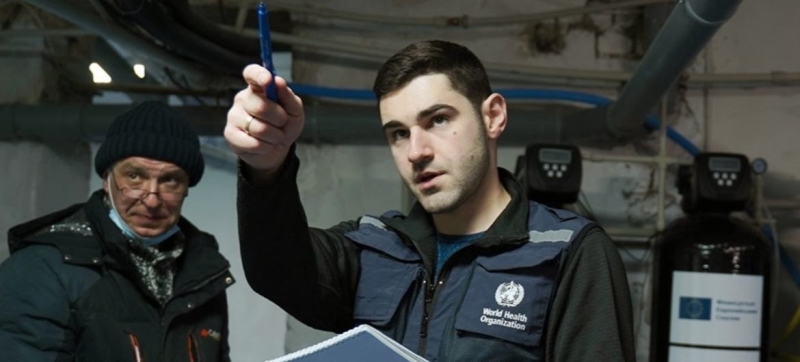- UN Warns Refugees Caught in Climate–Conflict Cycle |
- Mohammadpur Sub-Jail in Magura lies abandoned |
- BD trade unions demand 10-point climate action ahead of COP30 |
- Bangladesh criticises Rajnath remarks on Yunus |
- ‘Very unhealthy’ air quality recorded in Dhaka Sunday morning |
Protecting Clean Water Access Amid Rising Climate Risks

Amid the war in Ukraine, EU-funded water stations sustain health services for over a million people in the Kharkiv region. (file)
As climate-related health emergencies increase, governments are working with the United Nations to safeguard access to clean water. New data indicates that 118 million people in Europe alone live near healthcare facilities that lack basic sanitation.
“Healthcare facilities are where the vulnerable seek healing. Yet without adequate water, sanitation and hygiene, expected care can become inadvertent harm,” said Dr Hans Kluge, Regional Director for Europe at the World Health Organization (WHO).
He warned that healthcare systems are “being tested as never before” and stressed that strengthening them is essential for resilience during crises.
In response, a UN-led meeting in Budapest this week led to more than 40 countries adopting a programme to build more resilient and equitable water, sanitation and hygiene systems, collectively known as WASH. The 7th session of the Meeting of the Parties to the Protocol on Water and Health is co-led by the UN Economic Commission for Europe (UNECE) and the WHO.
The Protocol on Water and Health remains the only legally binding international treaty linking environmental protection, water governance and public health. It has supported progress such as expanding safe drinking water, protecting biodiversity and improving disease surveillance.
However, significant challenges persist. Alongside the 118 million people affected by inadequate sanitation, 70 million still lack access to safely managed drinking water, and 185 million do not have safe sanitation services. These vulnerabilities are deepening as droughts, floods and cyber threats increasingly disrupt systems.
“The Protocol is an example of how multilateral cooperation impacts our everyday lives, but we still have much work ahead,” said UNECE Executive Secretary Tatiana Molcean.
The Protocol also provides practical tools such as water safety planning and an equitable access scorecard, now used in more than 30 countries. It has supported at least 1,500 facility assessments and informed policies across schools, hospitals and urban communities.
Countries in the pan-European region have pledged to ensure safe water and sanitation for all through the Budapest Declaration and the Sustainable Development Goals (SDGs). “But no one tells you how to do it. That’s what the Protocol has to offer,” said Marta Vargha, Vice-Chair of the Protocol.
Concrete measures include ensuring safe water and menstrual hygiene in schools, monitoring wastewater for viruses including COVID-19, controlling Legionella bacteria in household systems, and developing carbon-neutral water services.
Ahead of the UN climate summit in Brazil, UNECE urged governments to place water and sanitation systems at the core of climate resilience. UN Secretary-General António Guterres echoed this message, noting that progress on water and sanitation is central to achieving multiple Sustainable Development Goals.

